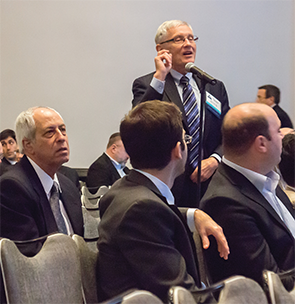MIAMI BEACH—As much of the rest of the country sat in cold, snow, and even blizzard conditions, otolaryngologists and other health professionals headed south recently to Miami Beach, Fla., for the 2016 Triological Society Combined Sections Meeting, held January 22-24. Senior members of the society and residents and students alike gathered in sessions exploring the pressing questions of the field, from evolving surgical techniques and technologies to discussions on how to adapt to healthcare reform. Nearly 600 physicians were in attendance.
Explore This Issue
March 2016Hamad Chaudhary, MD, MS, a fellow in head and neck oncology at Johns Hopkins University in Baltimore, said he attended the meeting two or three times as a resident, and came back again this year. “As a resident, it was good for engaging in what specialties I was more interested in,” he said. “Now it’s more talking to speakers from across the country and getting to know them. And, because it’s a more intimate meeting, it’s also about meeting a lot of the other residents and fellows from other programs and discussing their thoughts.”
Judith Lieu, MD, MSPH, an associate professor and resident education director at Washington University School of Medicine in St. Louis, Missouri, appreciates the mentoring she, as an educator, receives from the meeting. “I appreciated Gayle Woodson’s comments about ‘Scary Airway’ cases, which brought back lots of memories from my own training and my own practice. I appreciated that someone who has been around for such a long time and is so well respected is willing to share those experiences of fear and soldiering on despite the difficulties, and realizing that some things just don’t change. As a teacher, as an educator, whenever you’re dealing with a patient who is in that type of emergency, you can’t be one who is showing fear. You have to be the one who is the calmest, because everyone else is freaking out—that’s something that I try to teach my residents.”

Audience members during a panel discussion.
Presidential Address
Change is quickly descending on the medical field, and Triological Society President Fred Owens, MD, of the Owens Ear Center in Dallas, Texas, discussed adapting to change in his presidential address to audience members.
Change has played a big role in both his career and his personal life, he said. He told a story about a change in his life course that occurred as he was heading off to college. In those days, it was not uncommon to hitchhike there, which is what Dr. Owens was doing, carrying just one small bag. Someone stopped to pick him up near a fork in the road, he said, but the driver was headed toward Georgetown College in Kentucky, which is not where Dr. Owens was registered. Dr. Owens’ brother was at Georgetown, so he climbed into the truck anyway. There, he met someone he described as “a pretty nice-looking lady.”
“She looked up at me and said, ‘Why don’t you just go to Georgetown?’ And I said, ‘I believe I will.’ This woman later became his wife, “so that road turned out pretty good for me,” he said, adding that he and his wife, who was in the audience, are now almost inseparable.
Dr. Owens offered several suggestions on how to navigate change:
- Planning change is extremely important, and the first thing that one must do to make change occur is to have the desire to change.
- To work through change, a leader has to be knowledgeable, wise, and a good communicator.
- There is always resistance to change. Identify these people and realize that you will have to work with them.
- When you are planning change, you have to focus on the benefits of changing and include the risks of not changing; ask management to consider the risks of not making, as well as making, the change.
- Changing is difficult, but not changing can be fatal.
- Change can come in many forms, big or little.
- The secret to change management is to get started.
- You want to get feedback from everybody, which can come from the stakeholders, from other employees, from some of your clients, or from vendors.
- Once you get feedback, you have to make adjustments according to the advice you received.
- Always try to celebrate early successes.
- Stakeholders must be kept involved in a change process until its completion.
- At the end of a change process, evaluate what went well and what could be done to make the process more successful.
- After successful change projects, employees will be more comfortable with future projects.
- Decisions should be made carefully; the decisions that you make today will determine your tomorrow.
Thomas Collins is a freelance medical writer based in Florida.